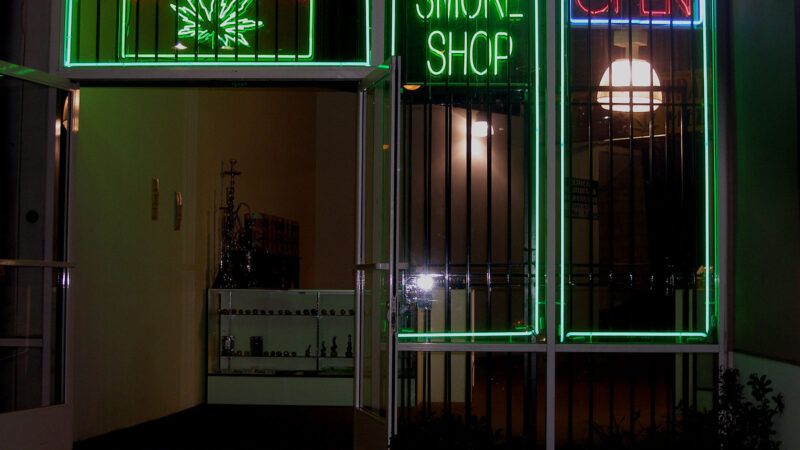Federal Drug Laws Force Pot Shops To Carry Lots of Cash and No Insurance. Now They're Getting Robbed.
Despite state legalization, federal prohibition makes break-ins harder on marijuana shops and manufacturers.

Multiple Bay Area retailers have been hit by smash-and-grab robberies in recent weeks. Cannabis businesses have been among the hardest hit, especially those in Oakland. To make matters worse, these cannabis retailers have been further disadvantaged thanks to misguided federal drug laws.
Cannabis is legal in California but illegal under federal law. As a result, most Golden State cannabis businesses struggle to secure business services like banking and insurance. Without access to banking services, and unable to take checks, debit cards, or credit cards, these businesses are forced to operate cash-only, which makes them appealing targets for robbers. And without insurance, a business will necessarily face additional difficulties when it is robbed.
Take the case of Alphonso "Tucky" Blunt Jr., the owner and operator of Blunts and Moore, a retail cannabis business that opened in Oakland in 2018. The store was granted a license as part of the city's Equity Permit Program, which reserves half of all cannabis business licenses for applicants who either have a marijuana conviction or live in certain heavily policed areas.
In addition to his staff, Blunt employs three armed guards, both to protect the store and to provide escort anytime an employee needs to travel with cash. If a traditional business needs to pay a bill, it could make an electronic payment, or get a certified check through its bank. But for a cannabis business that lacks access to bank services, a simple task requires needless complexity: In Blunt's case, just paying the store's monthly rent involves carrying cash to several different post offices to buy money orders, since each post office has a daily dollar limit for money order purchases. While Blunt says most cannabis businesses do not carry "an abundance of cash" on hand, he recognizes that most people do not know that, which makes stores like his an attractive target for thieves.
And because many of the big names in insurance steer clear of businesses that sell marijuana, Blunt says, retailers like his are forced to turn to newer, less reliable insurance outfits that force customers to "jump through every hoop possible" to get reimbursed. For example, after his store was robbed last summer, Blunt says, his insurance only paid $26,000 of an estimated $1 million (perhaps even more) in damages.
That level of coverage is simply unsustainable for some cannabis businesses. Eduardo Whittington is the founder of Lobo Cannagar, a pre-roll blunt and joint manufacturer headquartered in Oakland. On November 28, more than a dozen masked intruders broke into and robbed the shared work facility that Lobo Cannagar uses for manufacturing.
Whittington carries no insurance on the facility. He says he opted to go without it based on the many hassles and bad deals others in the industry had received. "The juice isn't worth the squeeze," he explains. Had Whittington sold alcohol or tobacco, or any other federally approved product instead of weed, he would have had no problem insuring his facility. But because he's in the legal marijuana business, which the federal government continues to frown on, Whittington is now on the hook for the full costs of the crimes committed against him and his company. The recent robbery could cost hundreds of thousands of dollars.
These problems are not new, nor are they limited to Oakland. Even when cannabis businesses find banks willing to work with them, the business owners are reluctant to name the banks publicly, for fear that the federal government will pressure the bank to close the accounts. Both this year and in 2019, the House of Representatives has passed versions of the Secure and Fair Enforcement (SAFE) Banking Act, which would loosen the requirements that disincentivize banks from taking marijuana businesses as clients. But even under Democratic control, it has stalled in the Senate, leaving hopeful cannabis businesses in the lurch.
Robberies and break-ins are an unfortunate risk for any business, but when that business involves marijuana, federal criminalization compounds the damage caused. There is a simple solution: The federal government should stop criminalizing marijuana, and allow cannabis businesses to compete in an open market just like any other.
Show Comments (56)